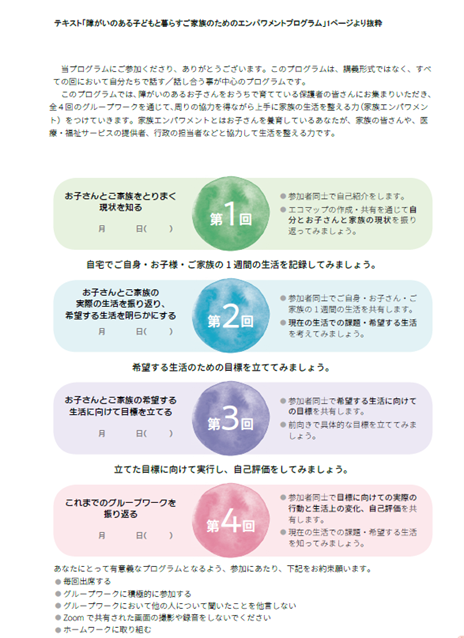Development and utilization of family empowerment programs
Fenton (1989) showed the elements of social isolation in families raising children with disabilities at home. He also reported that anxiety about child-rearing with few counselors, feelings of being separated from the mother of a healthy child or a child with a different disability, feelings of anxiety and guilt about the eyes of society lead to isolation from the local community1). Oliver (1986) also advocated the need to shift “disability” from an individual model to a social model in order to contribute to family empowerment. He reported that it was important to shift perspectives, disability is ①not a tragedy of the person but a factor of social alienation, ②not a problem of the person but a problem of society, ③creating an environment that is not limited to individual treatment but embracing society, ④from medical priority to emphasis on self-help, ⑤from training priority to respect for experience, ⑥not only to the adaptation of the individual but also to the change of social consciousness2). Cunningham and Davis (1985) argued that it was necessary to have a consumer model perspective in which families raising children with disabilities share mutual knowledge and experience on an equal footing, rather than providing information led by experts3). Having an environment in which families of critically ill children in the same situation can interact and help each other contributes to their home care.
In order for both children and their families to continue home care and life, the ability to properly control their lives, utilize social resources, and collaborate with family members and professionals, that is, enhancing family empowerment is important.
In the past 10 years, researchers and clinicians affiliated with University of Tsukuba, University of Tokyo, St. Luke’s International University, Ibaraki Prefectural University of Health Sciences, Ibaraki Christian University, and Tsukuba University Hospital have formed a research team to develop the Family Empowerment Program, a participatory program to enhance family empowerment. The program consists of a total of four sessions in a group format, where participants create eco-maps and lifestyle charts in group and homework to gain a bird’s eye view of their current living conditions, organize and grasp their own living issues while referring to the living conditions and resources of their fellow participants, and set goals for their desired lifestyle. In a pre-test program conducted in 2020, participating families were able to take action to adjust their lives and use social resources, and their J-FES scores increased significantly before and after the program (Wakimizu et al, 2022).
As shown in the flyer below, the online “Family Empowerment Program” was implemented in July 2021 and delivered to a total of 60 families from all over Japan. We would like to express our appreciation to all the families who participated in the program. We hope you will continue to take advantage of this program on a regular basis. If you are a local public organization or NPO and would like to see the program in person, please contact us using the form below and we will send you the facilitator’s book and participant’s text in the number of copies you request, by cash on delivery. Please contact us if you wish to do so.
In April 2022, Basic Research A “Construction and Verification of a Remote Care System to Promote Empowerment of Families Who Care for Children with Disabilities (Principal Investigator: Rie Wakimizu)” will start, and in April 2023, the Remote Care System, including the “Family Empowerment Program,”will be relaunched. We hope you will look forward to it.
1) Fenton M. Passivity to empowerment. 85, London: RADAR, 1989.
2) Oliver M. Understanding disability from theory to practice. 30-42, London: Macmillan Press, 1986.
3) Cunningham C, & Davis H. Working with parents: frameworks for collaboration. 10-17, Buckingham: Open University Press, 1985.
4) Wakimizu R, Fujioka H, Nishigaki K, Sato I, Iwata N, Matsuzawa A. Development of family empowerment program for caregivers of children with disabilities at home: Interim report up to ‘Implementation of pretesting’. Journal of International Nursing Research 1: e2021-0004. 2022 https://doi.org/10.53044/jinr.2021-0004



Please include your name (a handle or nickname is also acceptable) and contact us at the email address below:
riewaki★md.tsukuba.ac.jp (Please replace ★ with @)




